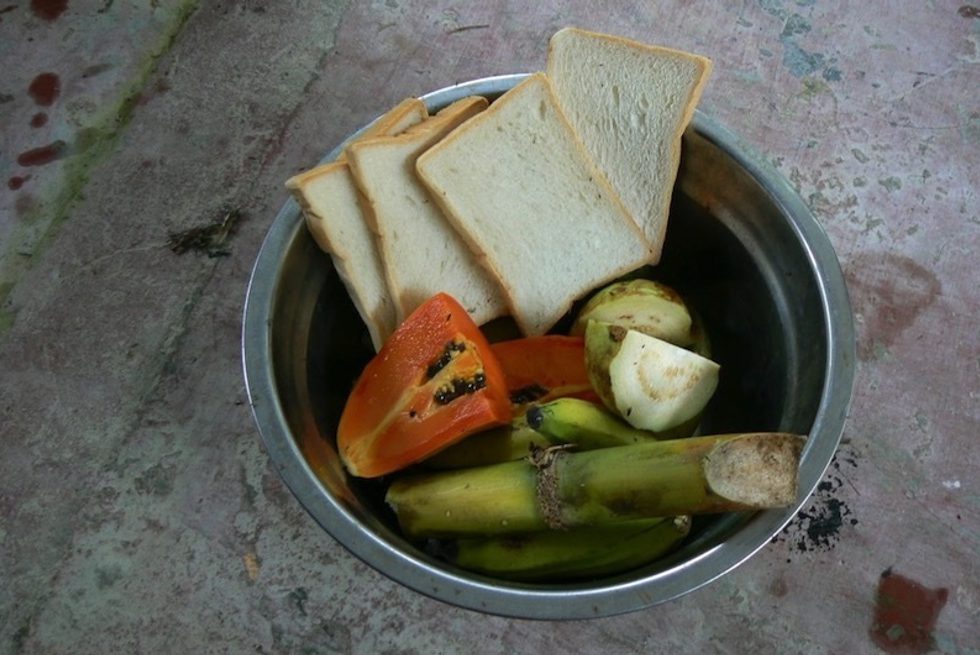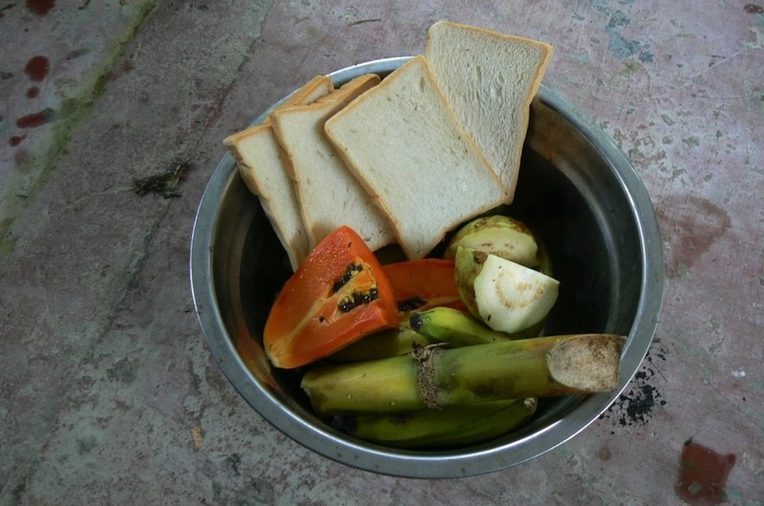A Joke of a Job: Naturalizing the Work of Semiwild Orangutans
From the Series: The Naturalization of Work
From the Series: The Naturalization of Work

In the late 2000s, Ricky and I sat on a feeding platform recently built by volunteers amid the rainforest at Lundu Wildlife Center. There, he and his colleagues rehabilitate orangutans displaced by dam construction and agricultural industrialization (see Parreñas 2018). Bananas and sweet potatoes were scattered around the platform, left out for the semiwild orangutan Ching to find. Ching’s semiwild state of captivity meant she was free to move within the confines of a wildlife center. For her, finding food was a literal performance of the idiom cari makan (English: to find food), a common phrase that also means to have a job. In Ching’s absence, Ricky joked that orangutans like Ching were busy with their job:
Their job: sit, sleep, travel around
Until 5:00 or 6:00 [am]: sleep
6:00 [am]: travel around
7:00 to 11:00 [am]: relax
11:00 [am] to 1:00 [pm]: play on the ground
2:00 pm: travel around and eat until it’s time to sleep again
Having the freedom of movement, Ricky seemed to suggest, did not define the life of a semiwild orangutan as it did for the postindustrial and mostly white British volunteers on site, who paid to perform hard labor constructing walkways and the feeding platform on which Ricky and I conversed (see Parreñas, forthcoming). Rather, Ricky’s joke conveyed that to be semiwild was to have a regimented schedule, one ruled by the hour, much like the increments of Ricky’s workdays. It followed that being a rehabilitant orangutan meant having a job in a nature park. The park was not a site of leisure but a workplace, just as it was a workplace for Ricky.
The orangutan rehabilitation center is a place that expands common assumptions about work and labor. This place is not only a site for commercial volunteerism. It is also a place where what looks like leisure, particularly the vision of semiwild orangutans freely roaming forests, is actually work regimented by the hour and compensated with what Ricky brings to the platform. That compensation is a literal expression of finding food. Through his joke, Ricky alludes to the idea that he, like Ching, makes a living at the wildlife center.
Ricky’s joke about an orangutan’s job traces one trajectory of a global problem with work. This problem is often perceived in terms of two extremes: overwork that ranges from exhausted plantations and exploited freelancers (Weeks 2011; Kingsley, Gray, and Suri 2015; Besky and Blanchette, forthcoming), and mass unemployment for which universal basic income is touted as a potential solution (Ferguson 2015). The labors undertaken by Ricky and Ching provide a different angle on the problem of work, one that cannot be reduced to either overwork or underwork. Instead, Ricky’s comment shows how ways of making a living and finding food become naturalized.
When food becomes the mode of exchange and compensation, as it does for semiwild orangutans—when their survival and ability to eat depends on the clockwork of a daily job—these efforts are subject to cultural acts of naturalization. This is different from expending calories to gain calories, as orangutans do in wild circumstances as foragers (Knott 1998). It also differs from the notion of nonhuman green capitalists. What we see here is not simply a mechanical need for food to survive. Rather, Ching’s finding of food performs a literal and metaphorical job.
The material food that semiwild orangutans earn conveys their status as neither wild nor completely captive. The food they are foraging is proxy for neither wildness nor domestication. This food given to them by the institution that holds them, the institution at which Ricky works, illustrates a status akin to modern laborers.

Is it a sad joke that the contents of the bowl pictured above are what semiwild orangutans eat, knowing that orangutans ideally eat an assortment of over two hundred plants (Galdikas 1988)? Similar to twentieth-century industrial workers, these orangutans are compelled to subsist on white bread. It was the fruiting season at the time I took this photo, so fresh bananas, guavas, sugarcane, and papaya are in the mix. All of these are regional cultivars, some introduced through transpacific trade (guava, papaya) and others domesticated in Southeast Asia (sugarcane, bananas). In American zoos, an orangutan diet consists primarily of animal feed like Purina Monkey Chow or ZuPreem Primate Diet Dry or Canned, which includes soy, corn, wheat, and animal fat (see Barbier 1985). Rehabilitant orangutans’ food is neither wild nor completely produced by the agricultural industry, as it is for zoo captives. Mirroring their status as semiwild, the food they earn is semicultivated.
Lighthearted jokes are often deadly business. In this case, a joke lends levity to serious problems. For Ricky, these involve the ubiquity and naturalization of working for a living. For Ching, working for a living is not just about finding food, but about the potential survival of an entire critically endangered species. It’s a sad joke, indeed.
Barbier, Robyn B. 1985. “Orangutans’ Color Preferences for Food Items.” Zoo Biology 4, no. 3: 287–90.
Besky, Sarah, and Alex Blanchette. Forthcoming. How Nature Works. Santa Fe, N.M.: SAR Press.
Ferguson, James. 2015. Give a Man a Fish: Reflections on the New Politics of Distribution. Durham, N.C.: Duke University Press.
Galdikas, Biruté M. F. 1988. “Orangutan Diet, Range, and Activity at Tanjung Puting, Central Borneo.” International Journal of Primatology 9, no. 1: 1–35.
Kingsley, Sara Constance, Mary L. Gray, and Siddharth Suri. 2015. “Accounting for Market Frictions and Power Asymmetries in Online Labor Markets.” Policy and Internet 7, no. 4: 383–400.
Knott, Cheryl D. 1998. “Changes in Orangutan Caloric Intake, Energy Balance, and Ketones in Response to Fluctuating Fruit Availability.” International Journal of Primatology 19, no. 6: 1061–79.\
Parreñas, Juno Salazar. 2018. Decolonizing Extinction: The Work of Care in Orangutan Rehabilitation. Durham, N.C.: Duke University Press.
_____. Forthcoming. “The Job of Finding Food is a Joke: Orangutan Rehabilitation, Work, Subsistence, and Social Relations.” In How Nature Works, edited by Sarah Besky and Alex Blanchette. Santa Fe, N.M.: SAR Press.
Weeks, Kathi. 2011. The Problem with Work: Feminism, Marxism, Antiwork Politics, and Postwork Imaginaries. Durham, N.C.: Duke University Press.